As pet owners, we often find ourselves pondering over the dining table scraps we can safely share with our furry friends. Among the myriad of food items, potatoes stand out as a common staple in households, sparking curiosity and concern among dog owners about their safety and nutritional implications for dogs.
Understanding which foods are safe for pets is crucial, as what’s beneficial for humans can sometimes be harmful to our canine companions.
This article aims to shed light on the nutritional benefits, potential risks, and safe ways to include potatoes in your dog’s diet, ensuring that your pet enjoys a healthy and balanced diet.
🥔➕🐕The Nutritional Profile of Potatoes
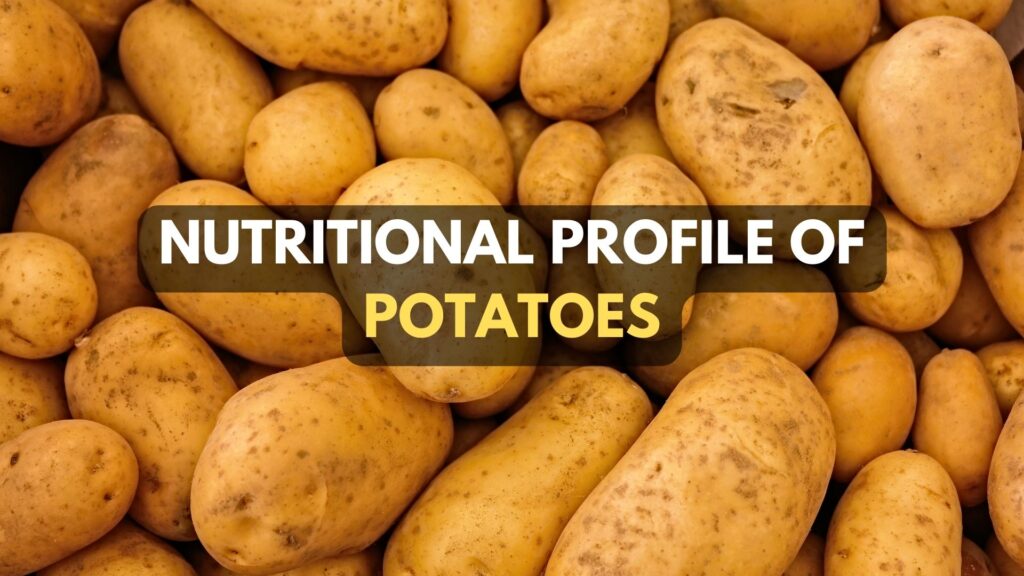
Potatoes are a versatile and widely consumed vegetable, known for their rich content of vitamins, minerals, and carbohydrates.
They contain vitamins such as vitamin C, vitamin B6, and potassium, which are essential for maintaining various bodily functions in humans and dogs alike.
The carbohydrate content in potatoes provides a source of energy, which can be beneficial in moderation.
However, the key to unlocking these nutritional benefits for your dog lies in understanding how these nutrients influence a dog’s health and how to prepare potatoes properly to ensure they are safe for canine consumption.
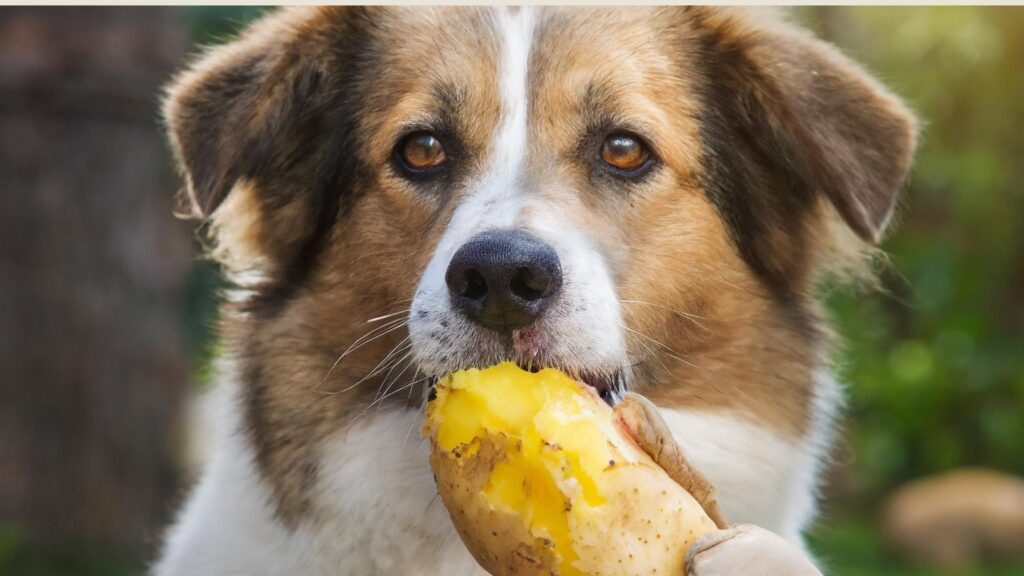
🥔🐶Can Dogs Eat Potatoes Safely?
The question of whether dogs can eat potatoes safely depends largely on the preparation and type of potatoes.
Raw potatoes contain solanine, a glycoalkaloid toxin that can be harmful to dogs if ingested in large quantities.
Cooking potatoes thoroughly reduces the solanine levels, making them safer for dogs to eat. It’s important to avoid feeding your dog raw potatoes and ensure that any potatoes they consume are cooked without added salt, spices, or other ingredients that could be harmful.
🍠🐾Sweet vs. White Potatoes: What’s Best for Your Dog?
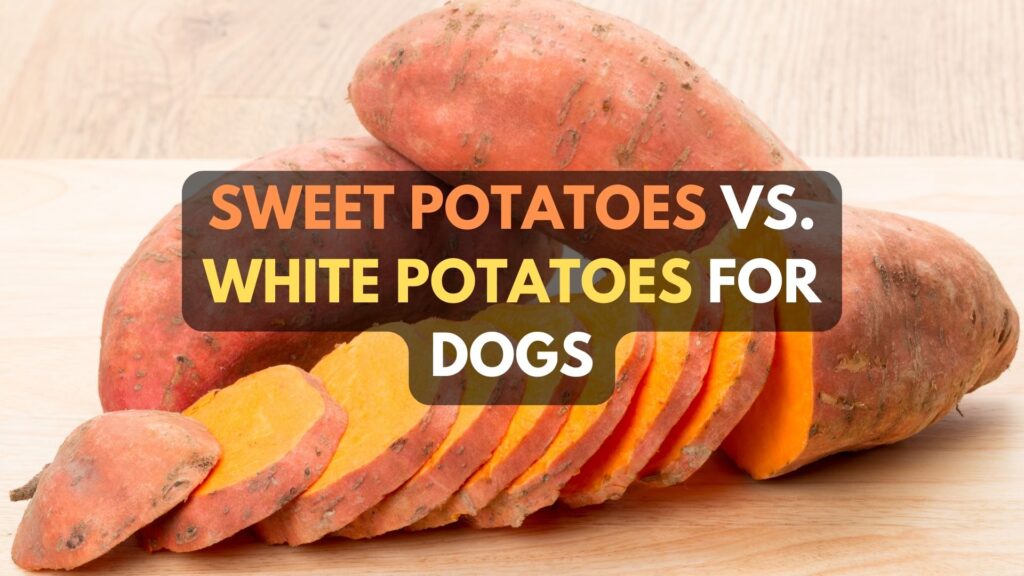
When it comes to types of potatoes, some are safer and more nutritious for dogs than others.
Sweet potatoes, for instance, are often recommended over white potatoes due to their higher fiber content and nutritional value.
They contain antioxidants, vitamins A, C, and B6, and are a great source of dietary fiber, all of which contribute to a healthy diet for dogs when served in moderation.
While dogs can safely eat potatoes, provided they are properly prepared and served in moderation. Cooking potatoes thoroughly to eliminate solanine and choosing sweet potatoes over white potatoes can help ensure that your dog benefits from the nutritional value potatoes offer without facing unnecessary risks.
As with any dietary change, it’s advisable to consult with a veterinarian to determine the best diet for your pet’s individual health needs.
🍽️🐕How to Prepare Potatoes for Dogs
Feeding your dog potatoes can be a nutritious addition to their diet when done correctly. Here’s a step-by-step guide on how to prepare potatoes safely for your dog, while ensuring they derive the maximum nutritional benefit.
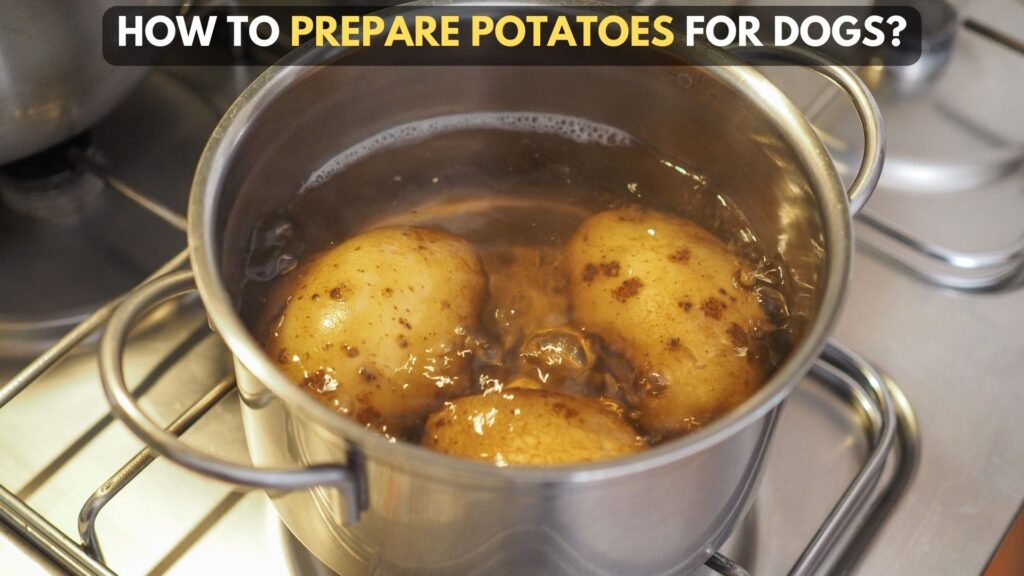
Step 1: Choose the Right Potatoes
Opt for sweet potatoes or well-ripened white potatoes. Sweet potatoes are generally a healthier option due to their higher fiber content and nutritional value.
Step 2: Clean Thoroughly
Wash the potatoes thoroughly under running water to remove any dirt and pesticides from the skin. It’s advisable to peel the potatoes to reduce the risk of solanine exposure.
Step 3: Cook Completely
Boil, bake, or steam the potatoes without adding any salt, seasonings, oils, or added fats. These additives can be harmful to dogs and lead to unnecessary health issues.
Ensure that the potatoes are cooked thoroughly to eliminate solanine, a toxic compound found in raw and undercooked potatoes.
Step 4: Mash or Cut into Small Pieces
Once cooked and cooled, you can either mash the potatoes or cut them into small, bite-sized pieces. This will make it easier for your dog to eat and digest.
Step 5: Serve in Moderation
Introduce cooked potatoes into your dog’s diet gradually. Start with small amounts to see how they react before making it a regular part of their diet.
A good rule of thumb is that treats and extras like potatoes should make up no more than 10% of a dog’s daily calorie intake.
🚫🥔Potential Health Risks and Considerations
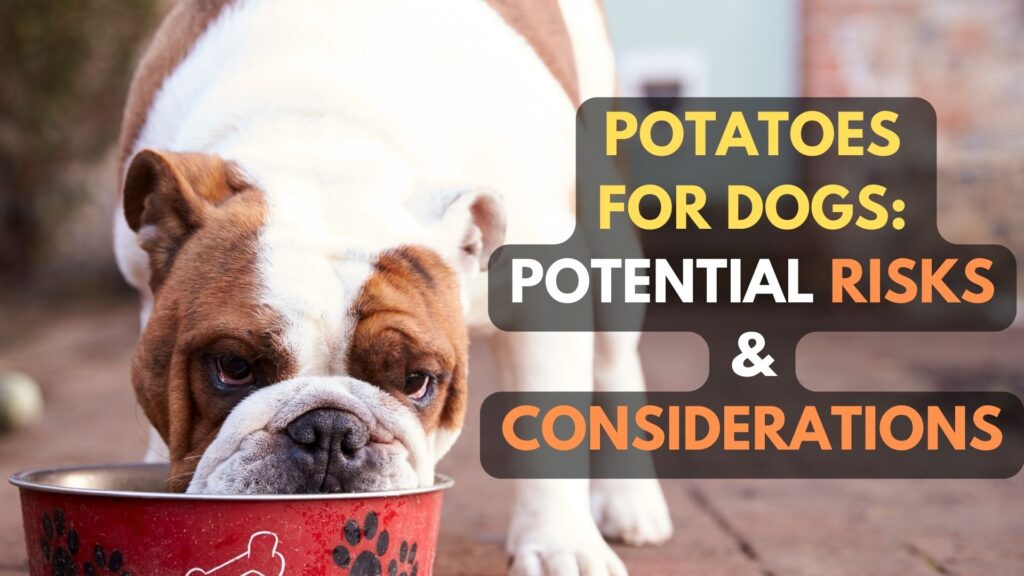
While potatoes can be a healthy addition to a dog’s diet when prepared properly, there are potential health risks and considerations to be aware of:
Obesity and Diabetes
Potatoes are high in carbohydrates, which can contribute to weight gain and obesity in dogs if fed in large quantities. This, in turn, can increase the risk of diabetes. It’s important to monitor your dog’s overall diet and ensure it is balanced.
Solanine Poisoning
Solanine is a toxic compound found in green or raw potatoes and potato plants. Symptoms of solanine poisoning include nausea, vomiting, diarrhea, and even heart problems.
Always ensure potatoes are fully cooked to reduce solanine content.
🆘🥔Signs of Potato-Related Health Issues
Keep an eye out for any adverse reactions after your dog consumes potatoes, such as digestive upset, lethargy, or allergic reactions. If you notice any unusual symptoms, discontinue feeding potatoes to your dog and consult a veterinarian.
Feeding your dog potatoes requires a balance and understanding of the proper preparation and potential risks involved.
By following these guidelines, you can safely incorporate potatoes into your dog’s diet, ensuring they enjoy the benefits without the downsides.
Always consult with a veterinarian if you’re unsure about introducing new foods into your pet’s diet or if your dog has specific health issues that could be exacerbated by dietary changes.
Frequently Asked Questions (FAQs)
Can dogs eat raw potatoes?
No, dogs should not eat raw potatoes. Raw potatoes contain solanine, a toxin that can be harmful to dogs. Always cook potatoes thoroughly to reduce solanine levels before feeding them to your dog.
📊🥔How often can I feed my dog potatoes?
Potatoes should only be fed to dogs in moderation as part of a balanced diet. Treats and extra foods like potatoes should not make up more than 10% of a dog’s daily calorie intake. It’s best to start with small amounts and not feed them potatoes daily.
Are sweet potatoes better for dogs than white potatoes?
Yes, sweet potatoes are generally considered better for dogs than white potatoes. They are richer in fiber and contain higher levels of vitamins A and C. Sweet potatoes also have a lower glycemic index, which can be beneficial for dogs’ blood sugar levels.
🧐🐶Can all breeds of dogs eat potatoes?
Most healthy dogs can eat potatoes as part of a balanced diet, regardless of breed. However, dogs with specific health issues, such as diabetes or obesity, may need to avoid or limit their intake of potatoes. Consult with a veterinarian for advice tailored to your dog’s health needs.
What should I do if my dog reacts badly to eating potatoes?
If your dog shows signs of an adverse reaction to eating potatoes, such as vomiting, diarrhea, or lethargy, stop feeding them potatoes immediately and consult your veterinarian. They can help determine the cause of the reaction and recommend the best course of action.
Summary
In conclusion, potatoes can be a healthy addition to a dog’s diet when prepared and served correctly. The key points to remember are the importance of cooking potatoes thoroughly to eliminate solanine, serving them in moderation, and choosing sweet potatoes over white potatoes for their higher nutritional value.
However, it’s crucial to be mindful of the potential health risks, such as obesity, diabetes, and solanine poisoning, and to watch for any adverse reactions in your dog.
Including potatoes in your dog’s diet should be done with care and consideration, always prioritizing their overall health and nutritional needs.
Before making significant changes to your pet’s diet, especially for dogs with pre-existing health conditions, consulting with a veterinarian is advisable. This ensures that any new additions, like potatoes, contribute positively to your dog’s health and well-being.


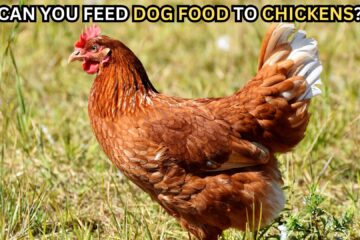
0 Comments